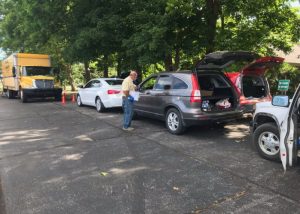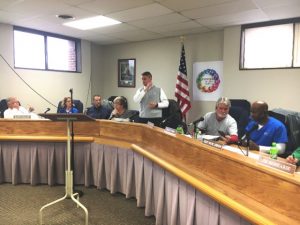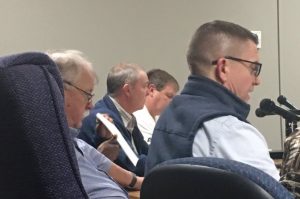News
UCHRA Continues Commodities Distribution During Pandemic
July 8, 2020
By:
During the COVID-19 pandemic, the Upper Cumberland Human Resource Agency (UCHRA) has made adjustments to keep clients, staff, and volunteers safe while providing non-perishable items to those in need.
Between April and June 2020, UCHRA’s commodities program has served more than 190,790 pounds of food worth more than $272,600 to 5,144 eligible households.
“This program is especially important to the citizens of the Upper Cumberland; now more than ever due to the effects of COVID-19 on our local businesses,” said Rebecca Harris, UCHRA Deputy Director and Transportation/Services Director.
UCHRA has implemented a series of safety protocols to ensure limited contact during the pandemic. These processes allow for limited in-person contact while ensuring that families in need continue to receive emergency food and nutrition assistance. For signups, clients can call into their local office and provide a staff member with the information needed for approval to receive commodities. The pickup process allows clients to drive up, check in, and have the commodities loaded into their vehicle by an attendant.
UCHRA’s commodities program distributes non-perishable food items to low-income families who reside in the region’s 14-county area. Funded by the US Department of Agriculture (USDA) through the Tennessee Department of Agriculture (TDA) and The Emergency Food Assistance Program (TEFAP), the commodities program provides emergency food and nutrition assistance to low-income families.
To qualify for commodities assistance, certain eligibility requirements must be met. The recipient may show proof of eligibility for one or more of the following means-tested programs: SNAP, Families First, Supplemental Security Income, Low-Income Home Energy Assistance Program (LIHEAP), or documented residence in public housing. Another option is for the recipient to complete a signed self-declaration of income showing that the total amount of household income is below 185 percent of the current federal poverty income level.
The commodities program is funded under a grant contract with the State of Tennessee. For more information about UCHRA or the agency’s commodities program, contact your local UCHRA office or call (931) 528-1127. A list of commodities distribution events can also be found on the UCHRA Facebook page at facebook.com/uchumanresourceagency.
About Upper Cumberland Human Resource Agency
The Upper Cumberland Human Resource Agency (UCHRA) was established by the Tennessee General
Assembly in 1973 to be the delivery system for human resources in the fourteen counties of the region. The programs operated by UCHRA initially included job training and transportation. During ensuing years, the UCHRA has expanded to supply a wide range of services that use a combination of funds from federal, state and local organizations.
School Board Budgets Pay Raises for Teachers and Other Staff but Less than Original Plans
July 8, 2020
By: Dwayne Page
Pay raises and funds for purchasing land to build a new elementary school highlight the proposed 2020-21 budget adopted by the Board of Education Tuesday night.
Under the plan, teachers and other certified staff will get a $1,000 pay raise while non certified employees will be given a $500 raise. This is less than what was included in the original plan adopted in May ($2,000 raise for teachers and $1,000 for support staff) but the board had to revisit its budget after the Governor and Legislature cut spending in the 2020-21 state budget due to the impact on revenues because of COVID-19.
During a work session prior to Tuesday night’s regular monthly School Board meeting, Director of Schools Patrick Cripps announced that the state has cut $250,000 in Basic Education Program (BEP) funding from the proposed budget but that the school system can absorb the loss by not filling the positions of four teachers who recently retired. Cripps said those positions are currently not needed due to fewer students. According to Cripps, the school system can still afford to fund the pay raises locally without help from the state and still have a healthy fund balance (reserves) of at least $800,000 by the end of the fiscal year next June.
The board was presented two options, a new budget with and without the pay raises. The Board chose to adopt the budget with the raises. Director Cripps also floated the idea of giving bonuses rather than raises, but the board opted for raises instead of bonuses and Cripps agreed.
Funds are also included in the school budget for the purchase of 24.5 acres of property on North Congress Boulevard near Northside Elementary School for construction of a new pre-K to 2nd grade elementary school. The price is $18,000 per acre for a total of $441,000. The purchase is subject to a favorable TDOT traffic study. The school budget includes $500,000 from the BEP technology fund to cover the cost.
The new revised proposed 2020-21 school budget will be presented for approval by the county budget committee Thursday night, July 9 at 6 p.m. at the courthouse. If it gets the okay there, the budget will be forwarded to the full county commission for adoption along with budgets for all other county departments on July 27.
Board of Education Adopts Plan to Reopen Schools August 3
June 2, 2020
By: Dwayne Page
It’s official!
DeKalb County Schools will reopen on Monday, August 3 barring a surge in COVID-19 which would force a change in plans.
During Tuesday night’s regular monthly meeting, the Board of Education voted to start school in the traditional manner with students attending in person on campus. But the board is also permitting parents who have concerns to opt for remote learning for their children due to COVID-19. Parents are asked to contact their child’s school weekdays from 9 a.m. until 2 p.m. prior to July 22 if they want their child to participate in remote learning.
Protocols have been established and will be observed for those who come to campus to help protect the health and safety of students and school staff including temperature screenings. Masks will be provided for staff and students and while it will be highly recommended that they be worn, it is not a requirement at this time.
Three sets of scenarios and protocols have been established depending upon the severity of the pandemic (Minimum, Moderate, or Substantial) during the year.
DeKalb County Schools will reopen August 3 under the “Moderate Community Spread” framework. (CLICK PDF LINK BELOW TO VIEW THE THREE SETS OF SCENARIOS AND PROTOCOLS)
Return to School Framework (PDF)
“We have got to get back to school. We understand the challenges and concerns people will face sending their kids to school or by remote learning and we don’t have all the answers but hopefully what we are doing tonight is reaching common ground for everyone. Therefore, it is my recommendation that we start school and open the buildings up on August 3 but that we give an opportunity for parents who don’t feel comfortable to do distance learning for their children. Parents need to contact the individual schools where their children attend if this is (distance learning) something they are interested in by July 22 because it will affect the students’ class schedule. We will work with each family to try to meet their needs. We will also work with teachers to provide the resources they need as well so they can best educate our students in DeKalb County,” said Director of Schools Patrick Cripps.
Parents and students should not expect the remote learning platforms to be quite the same as they experienced during the spring. “There will be stricter guidelines and schedules for students to follow so they can stay on task with their cohorts in the classroom,” said Cripps.
Three sets of scenarios and protocols have been established depending upon the severity of the pandemic (Minimum, Moderate, or Substantial) during the year.
DeKalb County Schools will reopen August 3 under the “Moderate Community Spread” framework with the following protocols:
Protocols for Busing and Student Transportation:
*It is highly encouraged that you provide transportation for your child if at all possible. Since buses are confined spaces and social distancing guidelines may be difficult to observe, it is highly recommended that face coverings be worn. Hand sanitizer will be available on each bus.
*Bus windows should be open when possible and the conditions allow
*Unloading of buses at school will be staggered to minimize mixing of students and temperature checks inside of the building.
*Siblings and family members sit together
*Assign seats for students
*Seats and handrails should be wiped down daily
*Bus drivers will instruct riders when it is time to unload
Class Size/Spacing Requirements:
*Arrange all desks facing the same direction toward the front of the room with as much space between them as possible.
*Arrange desks in order to practice as much social distancing as possible
*Classroom windows should be open when possible
*Assemblies and field trips are prohibited.
Movement Operations:
*Flow in hallway can be divided with either side following the same direction
*Efforts should be made to try and keep six feet of distance between persons in the hallways
*Efforts should be made to limit the number of students in the hallway by staggering dismissal
*Prohibit use of lockers and gathering in the hallway
*Teachers should stand out in the hallway with their doors open to support continued movement and traffic flow and limit touching of door hardware.
Protocols for Screening Students:
*Students are allowed to enter the building at only 1-2 sites
*Parents delivery services and or visitors are not allowed in the school building, only the front office
*Schools perform temperature checks on students once per day. Car riders’ temperatures will be taken before exiting the car. Bus riders temperatures will be taken upon exiting the bus
*Parents should check their child’s temperature at home every morning and students with a temperature of 100.4 or above should stay home.
*Parents should ask their children or monitor for any cough, congestion, or shortness of breath every morning.
*Students who fall ill at school should be placed in an area of quarantine with a surgical mask in place until picked up.
*Students who have a temperature of 100.4 or above must produce negative COVID-19 results or self-quarantine for 14 days
Protocols for Staff Arrival:
*All staff should be screened with a no touch thermometer and ask COVID-19 screening questions. Those with elevated temperatures or who fail the screening questions are asked to return home.
*Employees should wash or sanitize hands upon entering the building.
Protocols for Dining, Gathering, and Extracurricular Activities:
*Students, teachers, and cafeteria staff wash hands before and after every meal.
*If possible, classrooms should be used for eating in place
*Students may bring in food from home.
*School supplied/packaged meals may be used
*Meal times can be staggered to create seating assignments
*Disposable utensils should be used and placed on the tray by an adult
*Serving and cafeteria staff should use barrier protection, including gloves, face shields, and masks when possible
*Grab and Go meals are highly recommended for breakfast
*Alternate eating meals in the classroom and in the cafeteria for lunch
*Open selection of food such as salad bars, self-service stations should be closed or manned by an adult to avoid multiple surface touches.
Gatherings and Extracurricular Activities:
*Off site field trips are not permitted
*After school programs may continue
Protocols for Athletic Activities:
*Weight room and physical conditioning activities should only be used with proper social distancing
*Schools will consult with health officials and school sports governing bodies for current public health guidance on sports with close contact.
Cleaning Protocols:
*Routine cleaning with standard cleaning supplies
*Frequently touched surfaces, including lights, doors, benches, bathrooms, etc. should undergo cleaning more frequently.
*Libraries, computer labs, arts and other hands on classrooms should undergo standard cleaning procedures per normal operating status.
*Student desks should be wiped down at the beginning of each day
*Playground and athletic equipment can be cleaned twice daily
Plan of Action:
*When an individual in the school is showing signs or symptoms or has been diagnosed with COVID-19 the following are important elements of the plan:
*Immediately place a cloth face covering or surgical mask on the ill individual and move them to the place your school has identified as a safe place to isolate.
*Anyone assisting the individual should put on a cloth face covering. Limit the number of people who are in direct contact with the ill.
*Ensure the individual is safe and does not need emergent medical attention
*Notify the sick individual’s parent or guardian so they can be picked up from school
*Clean and disinfect areas where the ill individual has been while in the building
Return to School Framework (PDF)
« First ‹ Previous 1 1159 1249 1257 1258 12591260 1261 1269 1359 2327 Next › Last »












